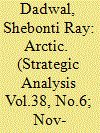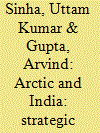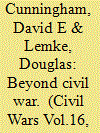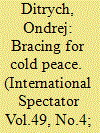|
|
|
Sort Order |
|
|
|
Items / Page
|
|
|
|
|
|
|
| Srl | Item |
| 1 |
ID:
136579


|
|
|
|
|
| Summary/Abstract |
The article examines the reasons behind the Aquino administration’s instantaneous
support for the Obama administration’s pivot to Asia as the Philippines negotiated
and signed a framework agreement on enhanced defense cooperation with the United States. This outright backing stems from President Aquino’s determination to counter China’s expansionism in the South China Sea. The 2012 Scarborough Shoal stand-off between the Philippines and China has validated the immediacy of this security arrangement which jibes with the U.S. strategic policy. In conclusion, the article contends that a small power like the Philippines—when confronted by an emergent and potentially expansionist power—is not necessarily helpless since it has foreign policy choices, as well as the power to chart its own destiny.
|
|
|
|
|
|
|
|
|
|
|
|
|
|
|
|
| 2 |
ID:
135272


|
|
|
|
|
| Summary/Abstract |
Although some Middle Eastern countries, such as Saudi Arabia and Turkey, have tried to influence developments in Afghanistan from time to time, Iran—due to a long common history, geographic proximity, and cultural similarities—is by far Afghanistan's most important neighbor. In this article I seek to demonstrate that Iran, contrary to its image and often even more consistently than pro-Western countries such as Saudi Arabia and Turkey, has since 1979 acted in favor of an independent, centrally and moderately governed Afghanistan. Therefore, Iran will probably also be a stabilizing factor rather than a spoiler in every post–International Security Assistance Force (ISAF) scenario in Kabul.
|
|
|
|
|
|
|
|
|
|
|
|
|
|
|
|
| 3 |
ID:
134833


|
|
|
|
|
| Summary/Abstract |
Al-‘Eizariya (Bethany) is one of East Jerusalem’s eastern neighborhoods located on the historic Jerusalem-Jericho route, two miles from Jerusalem. The reality of al-’Eizariya has changed dramatically in the last two decades. After the Oslo Accords (1993) were signed, al-‘Eizariya expanded to accommodate the flood of migrants who arrived due to an economic boom and the political expectation that it would be part of the future capital of the state of Palestine. All this economic growth has since been disrupted by the failure of the Oslo Accords1 and the construction of the Separation Wall beginning in 2002.2
|
|
|
|
|
|
|
|
|
|
|
|
|
|
|
|
| 4 |
ID:
136810


|
|
|
|
|
| Summary/Abstract |
India and Australia have overall traditionally shared cordial relations despite hitting rough weather during certain phases. With India’s efforts to look further east beyond her immediate south-eastern neighbors, and Australia’s desire to look further west beyond Japan and South Korea, have of late brought greater convergence in their interests.
|
|
|
|
|
|
|
|
|
|
|
|
|
|
|
|
| 5 |
ID:
135031


|
|
|
|
|
| Summary/Abstract |
As global warming and melting of the ice is making the Arctic increasingly accessible, the region’s hydrocarbon riches are attracting international interest. Thus far, despite the presence of vast untapped energy and mineral resources, the Arctic is not considered a geopolitical hotspot. In fact, many of the Arctic states have dismissed the possibility of conflict over the region’s spoils due to the collaborative governance model that has been established. But as the demand for resources grows interminably, and factors in the international energy market begin impinging on the region, how long will the Arctic manage to retain its peaceful environment?
|
|
|
|
|
|
|
|
|
|
|
|
|
|
|
|
| 6 |
ID:
135045


|
|
|
|
|
| Summary/Abstract |
A global temperature rise is being experienced earliest and most intensely in the Arctic region. The changes are worrying but the commercial interests are equally enticing. The Arctic is witnessing the convergence of the geophysical, the geo-economic and the geostrategic in strange and dramatic ways, making it a paradox and an antithesis. For India, the Arctic is distant when it comes to economic interests and near when it comes to climate change. As India today reassesses and rethinks its role in the new global geopolitical space, the Arctic becomes an important part of that reorientation and a movement towards a ‘global knowledge commons’. The Arctic is now an important geographical categorisation in India’s global policies. It must also be stressed that recent Arctic ascendancy in the policy domain stems directly from the strengthening of India’s climate change-linked economic and scientific positions in global world affairs.
|
|
|
|
|
|
|
|
|
|
|
|
|
|
|
|
| 7 |
ID:
136421


|
|
|
|
|
| Summary/Abstract |
Armenia does not have direct access to the sea, and its land transportation opportunities are limited due to the conflict with Azerbaijan and its support by Turkey.
Armenia is extremely transport-dependent on Russia. For example, JSC Russian Railways, which is essentially not interested in revolving the urgent problems of the country’s transportation system, is the concession operator of Armenia’s railways.
These complicated transportation and communication conditions create geopolitical and geo-economic threats for Armenia; if they are not dealt with, making successful basic changes and raising the country’s economic competitiveness will be inconceivable.
This article identifies the problems Armenia’s railway system faces and highlights regional transit issues from the perspective of the main development characteristics of landlocked countries.
|
|
|
|
|
|
|
|
|
|
|
|
|
|
|
|
| 8 |
ID:
136664


|
|
|
|
|
| Summary/Abstract |
This article examines how the Association of Southeast Asian Nations (ASEAN) conflict management process in the South China Sea (SCS) has been conducted and whether the ASEAN way can effectively manage the dispute, in which China is a prime and important actor. It argues that rising tensions in the South China Sea are a direct result of the changed balance of power in the region given the asymmetry between China and ASEAN members. China has taken advantage of ASEAN efforts to develop a code of conduct that is premised on the ASEAN way.
Introduction
|
|
|
|
|
|
|
|
|
|
|
|
|
|
|
|
| 9 |
ID:
135027


|
|
|
|
|
| Summary/Abstract |
Building on stakeholder management theory, this article examines the salience of Asian stakes in three key areas of Arctic governance: management and use of natural resources; shipping; and environmental protection. The Asian states that are now permanent observers in the Arctic Council have significant stakes in Arctic governance, but their salience varies considerably across these issue areas. Viewing stakeholder patterns in relation to the differentiated roles that the Arctic Council plays in Arctic governance makes it possible to derive some policy implications regarding the depth of Asian state involvement in that body.
|
|
|
|
|
|
|
|
|
|
|
|
|
|
|
|
| 10 |
ID:
135874


|
|
|
|
|
| Summary/Abstract |
The article looks at structural analogies between the strategic situation in Europe in the summer of 1914 and in East Asia today, with particular emphasis on the probability of the outbreak of a major war. The author examines analogies regarding the nature of the international system, i.e. is the international system characterized by outright anarchy or by a more or less developed and institutionalized understanding among the main actors about the way to preserve peace and to organize economic exchange? The article addresses domestic factors (nationalism, democratic, authoritarian or semi-democratic regimes) and investigates military dynamics against the backdrop of geography and the availability of military equipment and technologies. Possible routes of military escalation are also discussed. Special attention is paid to states that have isolated themselves and that dispose of military means that might promise swift victory. The article comes to the conclusion that there are very few similarities between Europe in 1914 and East Asia today, but that both the high degree of militarization of the Korean peninsula and the evolving military competition between the US and China in the region do imply the possibility of a major armed conflict in a not too distant future
|
|
|
|
|
|
|
|
|
|
|
|
|
|
|
|
| 11 |
ID:
137029


|
|
|
|
|
| Summary/Abstract |
Many authoritarian regimes selectively provide critical segments of the population with privileged access to goods and services, expecting political support in return. This article is interested in the effects of this regime strategy: Is violent opposition less likely to occur in subnational regions bound to the ruling elite through such patron–client networks? For its empirical analysis, the article makes use of crowdsourcing data on the number and geospatial distribution of fatalities in the Syrian civil war from March 2011 to November 2012. In terms of selective goods provision, the focus is on the electricity sector. Satellite images of the earth at night are used to proxy spatial variations in the public distribution of electricity in times of power shortages. These data are complemented with information from the last Syrian population census of 2004. Estimations from fixed effect logit models lend support to the hypothesis that the risk of violence has been lower in subdistricts that have been favored by the ruling regime in terms of preferential access to material goods. This hypothesis is further corroborated with qualitative evidence from Syrian localities.
|
|
|
|
|
|
|
|
|
|
|
|
|
|
|
|
| 12 |
ID:
134995


|
|
|
|
|
| Summary/Abstract |
Australia’s foreign and security policy debate has become focused on how to manage the fundamental change in strategic and economic circumstances brought about by China’s rise. For the first time in the
nation’s history, Australia’s chief trading partner is neither an ally, nor the ally of an ally, and does not share its democratic outlook and values. This change comes against the backdrop of an increasingly
contested Indo-Pacific Asia. This article addresses two questions. First, how does Australia perceive a rising and increasingly powerful China? Second, how is Australia responding? It is argued that Australia possesses a discernable China strategy, although questions remain about its implementation, effectiveness and sustainability. That strategy has two broad strands—engagement and hedging—and the hedging strand contains several important sub-strands, namely, internal balancing (modernizing Australia’s own military) and external balancing (especially strengthening the US alliance). Each of these hedging approaches carries its own problems and questions, particularly regarding Australia’s willingness to fund an advanced military and whether the net effect of a strengthened US alliance can be stabilizing.
|
|
|
|
|
|
|
|
|
|
|
|
|
|
|
|
| 13 |
ID:
136093


|
|
|
|
|
| Summary/Abstract |
A large quantitative cross-national literature examines why countries are more or less likely to experience civil war. Many of the theories motivating hypotheses about civil war are really arguments about when violence will happen without necessarily explaining why this violence is organized or targets the state. In this article, we examine how variables identified as causing civil war affect other forms of internal violence such as communal conflict, one-sided violence, riots, purges, and coups d'état. We find that factors such as ethnic fractionalization, population, terrain, economic development, and regime type similarly affect different measures of violence. We suggest two avenues for further research – expanding beyond civil war to study determinants of violence within countries more broadly and focusing more directly both theoretically and empirically on the specific determinants of civil war.
|
|
|
|
|
|
|
|
|
|
|
|
|
|
|
|
| 14 |
ID:
135554


|
|
|
|
|
| Summary/Abstract |
What the British historian Eric Hobsbawm called “the long 19th century” ended 100 years ago, in 1914, in Sarajevo, with the two pistol shots that sparked World War I. Another historian, Fritz Stern, described that war as “the first calamity of the 20th century … the calamity from which all other calamities sprang.” These disasters included the Great War itself, which claimed some 20 million lives, including victims of the new century’s first genocide, in Turkey; the October Revolution in St. Petersburg, which gave birth to an ideological empire that would kill tens of millions of people and imprison hundreds of millions more; the rise of Nazism out of Germany’s defeat; World War II, with another 60 million deaths, including genocide on an unprecedented scale; the upheavals and wars beyond the borders of Europe that followed the end of colonialism; and the division of the postwar world into two nuclear-armed camps, which fought each other through proxies in post-colonial lands.
|
|
|
|
|
|
|
|
|
|
|
|
|
|
|
|
| 15 |
ID:
134902


|
|
|
|
|
| Summary/Abstract |
Between 1820 and 1848, one hundred and forty-eight American Protestant missionaries arrived in the Hawaiian Islands. How did these Americans, eschewing private property and their U.S. homeland, move from devotion to the Hawaiian monarchy to support for U.S. annexation? It is a dramatic story best told from within the confines of household economics: The problems of parenthood and costs associated with raising children. This essay examines the U.S. role in the world through the influence of American families living abroad. In the case of the Hawaiian Islands, the transition of idealistic evangelists to harried parents had intense political ramifications for both the United States and Hawaiian Kingdom, and missionary children would reap the economic fruits of their parents’ labors.
|
|
|
|
|
|
|
|
|
|
|
|
|
|
|
|
| 16 |
ID:
134828


|
|
|
|
|
| Summary/Abstract |
Usually when the massive plates that float over the Earth’s molten core collide, the intense pressure over millions of years pushes the land upward. It is this force that has created some of the world’s most breathtaking mountain ranges. About 80 million years ago, for some reason, when the Asian plates encountered the African and European plates this wasn’t the case. Instead of the earth lurching upwards towards the sun, the plates separated, creating the volatile Syrian East African Rift Valley: A valley that includes the world’s lowest point — the Dead Sea — 427 meters below sea level.
|
|
|
|
|
|
|
|
|
|
|
|
|
|
|
|
| 17 |
ID:
136868


|
|
|
|
|
| Summary/Abstract |
This article critically examines the use and effectiveness of border controls in the European Union (EU)'s counter-terrorism policy. It shows that the EU has made substantial progress towards achieving the objectives that it had set for itself in this policy area, but has not managed to fulfil all of them, and certainly not by the deadlines originally set. It further argues that, contrary to their usual depiction in EU official documents, these border control measures make a limited contribution to the actual fight against terrorism, whilst having some negative effects. From that viewpoint, the fact that the EU has failed to meet all of its objectives in the use of border controls for counter-terrorist purposes may paradoxically be seen as a positive outcome.
|
|
|
|
|
|
|
|
|
|
|
|
|
|
|
|
| 18 |
ID:
135303


|
|
|
|
|
| Summary/Abstract |
The crisis in Ukraine has turned the tables of the post-Cold War relationship between the United States and Russia. The ongoing transformation can result in a number of outcomes, which can be conceived in terms of scenarios of normalisation, escalation and ‘cold peace’ – the latter two scenarios being much more probable than the first. NATO ought to shore up its defences in Central and Eastern Europe while Washington and its allies engage in a comprehensive political strategy of ‘new containment’. This means combining political and economic stabilisation of the transatlantic area with credible offers of benefits to partners in the East and pragmatic relations with Russia which are neither instrumentalised (as was the case with the ‘reset’) nor naïvely conceived as a ‘partnership’.
|
|
|
|
|
|
|
|
|
|
|
|
|
|
|
|
| 19 |
ID:
134845


|
|
|
|
|
| Summary/Abstract |
In the 1950s, when the communists came to power in both Vietnam and China, they warmly called each other “brothers,” affirming significant similarities of culture as well as ideological kinship. Over the years, however, attempts by Vietnam’s elder and stronger brother, China, to exert its authority have not always been accepted by its headstrong sibling. This filial defiance is rooted in a thousand years of Vietnamese resistance to attempts by Chinese feudal dynasties and their successor regimes to dominate it. Memories of that history and especially of the bloody nose the Vietnamese gave the People’s Liberation Army (PLA) in 1979, when it invaded to “teach Vietnam a lesson,” are central to understanding the relationship between the two countries today.
|
|
|
|
|
|
|
|
|
|
|
|
|
|
|
|
| 20 |
ID:
134839


|
|
|
|
|
| Summary/Abstract |
I recall a small, private Berlin dinner at which a senior official of the government of Chancellor Gerhard Schröder chastised me, the American guest, over Guantánamo. It showed an egregious disregard for international law among other things, the cabinet minister advised me. During the course of the evening, that same official also volunteered that, were the Guantánamo detainees on German soil, the Federal Republic would not know exactly what to do with them. This reminds me of the undiplomatic remark of a Berlin-based British diplomat from around the same time who quipped to me: “When Germans face a dilemma, they stare it in the face—then proceed to walk away, leaving the hardest choices for others.
|
|
|
|
|
|
|
|
|
|
|
|
|
|
|
|
|
|
|
|
|